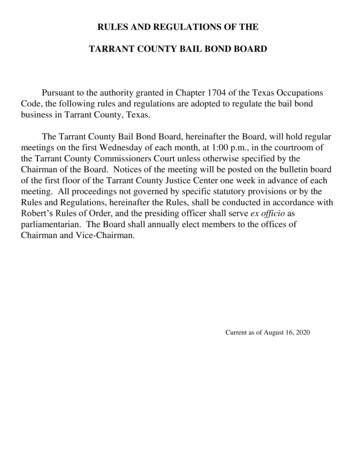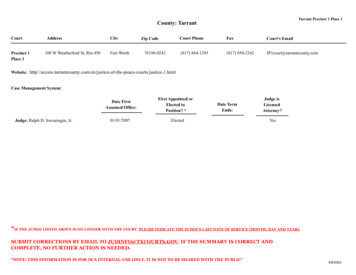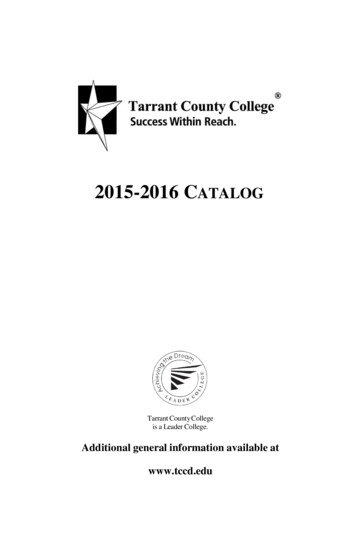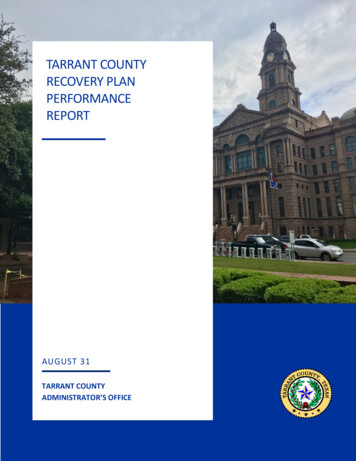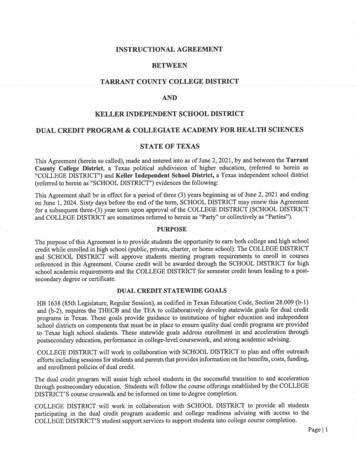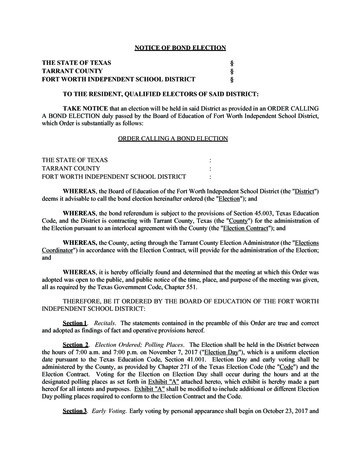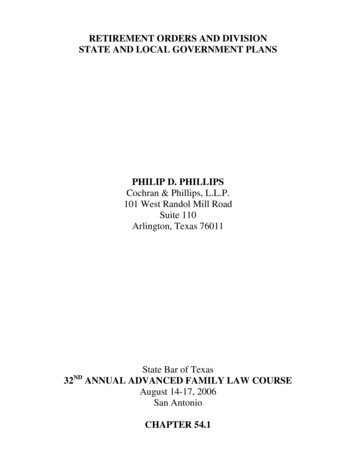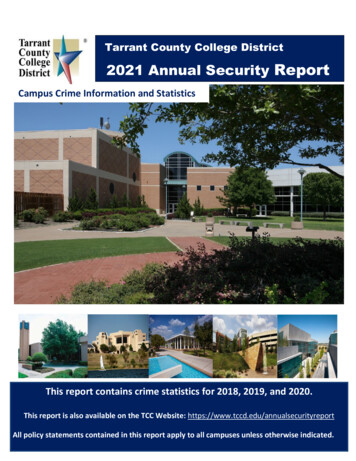
Transcription
Tarrant County College District2021 Annual Security ReportCampus Crime Information and StatisticsThis report contains crime statistics for 2018, 2019, and 2020.This report is also available on the TCC Website: https://www.tccd.edu/annualsecurityreportAll policy statements contained in this report apply to all campuses unless otherwise indicated.
MESSAGE FROM THE CHIEFTarrant County College places a high priority on the safety of its students andstaff. To assure you of the best possible protection, the College employs a highlytrained campus police force supported by the latest in crime-preventioneducation. The Department is committed to a comprehensive approach topreventing, preparing for, responding to and recovering from emergencysituations. Whether you are on one of the TCC campuses as a student, visitor,staff or faculty member, you can be confident that our police department isworking to keep you safe.As a progressive department, the Tarrant County College Police Department embraces community policing.Community policing is based on the fundamental understanding that police officers are public servants. As apublic servant, the officer needs to serve the public not only as a protector but also as a mediator, aninformation provider or any one of a number of other roles. Our officers canvass the District on foot, in patrolcars or on bicycles talking to community members and solving problems along the way.Safety and security are shared responsibilities. Effective safety and protection require the cooperation and assistanceof all members of the College community. Each of us must take basic precautions such as being aware of ourimmediate surroundings, locking vehicle doors and securing rooms or buildings where high-dollar items, valuables orequipment are located. Remember, we cannot fight crime if it is not reported. Promptly report all crimes againstpersons or property that occur on TCC properties to the Tarrant County College Police Department.I encourage you to read the important information in this brochure carefully. You will discover why Tarrant CountyCollege is consistently ranked among the safest colleges. The men and women of the Tarrant County College PoliceDepartment have made great strides in adopting a philosophy of enforcement that places emphasis on service andeducation. We are constantly striving to provide a safe and secure environment conducive to higher educationlearning.Shaun P. WilliamsChief of PoliceTarrant County College District
MESSAGE FROM THE CHIEF .INSIDE COVERI. OVERVIEW OF POLICE DEPARTMENT . 6Mission StatementVision StatementPolice Department PersonnelJurisdiction of Campus Police/Law Enforcement Authority AgreementsJeanne Clery DisclosureDistribution and Availability of the Annual Security ReportDaily Crime LogII. REPORTING PROCEDURES . 8How to Specifically Report Crimes/EmergenciesOther Reporting OptionsResponse to a ReportVoluntary Confidential ReportingNotice of Penalty for False Alarm or ReportWhistleblower Protection and Anti-RetaliationClery Reportable TripsReporting Stolen Identification InformationAgencies to ContactIII. TIMELY WARNING NOTICE PROCEDURES . 11How Campus Timely Warning Notices are IssuedIV. EMERGENCY NOTIFICATION . 12Emergency Notification ScopeHow Emergency Notifications are IssuedDecision TeamEmergency Operation PlanKnow What to Do, Emergency Situations and Actions You Should TakeEvacuation ProceduresBasic Shelter-in-Place GuidanceLockdown ProceduresEmergency Procedures/Test Emergency Responses2020 After Action ReportV. MONITORING OF CRIMINAL ACTIVITIES OF STUDENT ORGANIZATION LOCATIONS . 19VI. SECURITY OF AND ACCESS TO CAMPUS FACILITIES . 19Security of Campus FacilitiesAccess to Campus Facilities
VII. MAINTENANCE OF CAMPUS FACILITIES . 20VIII. CRIME PREVENTION AND SECURITY AWARENESS PROGRAMS . 20Crime Prevention and Safety Awareness ProgramsCritical Incident InformationTarrant County Crime Stoppers ProgramEducation of Members of the TCCD CommunityIX. ALCOHOL AND DRUG POLICY .23Alcohol-Drug Education ProgramsTobacco PolicyX. SEXUAL OFFENSES AND SEXUAL MISCONDUCT PROTOCOL .24Federal Clery Act Definitions of Domestic Violence, Dating Violence, Sexual Assault and StalkingJurisdictional Definitions of Domestic Violence, Dating Violence, Sexual Assault and StalkingTarrant County College District Definitions of Domestic Violence, Dating Violence, Sexual Assault and StalkingBystander InterventionRisk ReductionPrograms to Prevent Domestic Violence, Dating Violence, Sexual Assault and Stalking Primary prevention and awareness programs for all incoming students and employees Ongoing prevention and awareness programs for students and employeesProcedures Victims Should Follow if a Crime of Domestic Violence, Dating Violence, Sexual Assault or Stalking OccursLocal HospitalsInvolvement of Law Enforcement and Campus AuthoritiesLocal Police DepartmentsProcedures for Reporting Domestic Violence, Dating Violence, Sexual Assault and StalkingDistrict Title IX Coordinator and Deputy Title IX CoordinatorsProcedures the College Will Follow When a Crime of Domestic Violence, Dating Violence, Sexual Assault or Stalking isReportedProcedures for Student Violations of the Tarrant County College District Sexual Misconduct ProtocolProcedures for Employee Violations of the Tarrant County College District Sexual Misconduct ProtocolAssistance for Victims: Rights and OptionsStudent Code of Conduct Special Provisions for Sexual Misconduct and Other Sensitive IssuesState of Texas Crime Victim’s RightsTarrant County College’s Responsibilities for Orders of ProtectionHow to Apply for a Protective OrderTarrant County College District No Contact OrdersAccommodations and Protective Measures Available for VictimsCampus and Community Resources for Victims Northeast Campus Northwest Campus and Erma C. Johnson Hadley Center of Excellence for Aviation, Transportation and Logistics Trinity River Campus Southeast Campus South Campus and TCC Opportunity CenterAdditional Community Resources for VictimsOnline State and National ResourcesConfidentialityAdjudication of ViolationsSanctions and Protective MeasuresNotification to Victims of Crimes of ViolenceCampus Sex Crime Prevention Act Information
XI. ANNUAL DISCLOSURE OF CRIME STATISTICS . 74Reporting the Annual Disclosure of Crime StatisticsStatistical Data CollectionCampus Security AuthoritiesHate Crime ReportingCategories of Bias DefinitionsXII. CAMPUS CRIME STATISTICS . 76Clery Geographic AreasDefinitions of Statistical CategoriesStatistical Reports of Crime 2020-2020South CampusNortheast CampusNorthwest CampusSoutheast CampusTrinity River CampusTarrant County College Opportunity CenterErma C. Johnson Hadley Northwest Center of Excellence for Aviation, Transportation and LogisticsAll policy statements contained in this report apply to all Tarrant County College campuses unless otherwise indicated.5
I. OVERVIEW OF THE POLICE DEPARTMENTMission StatementThe Tarrant County College Police Department is charged with the responsibility of protectingthe life and property of individuals who comprise the student body, faculty, and staff of theTarrant County College community. The primary responsibilities of the Tarrant County CollegePolice Department are to provide campus security and to provide students with a safe andsecure environment in which to learn.Vision StatementAs professionals of the Tarrant County College Police Department, we are committed to the pursuit of providing a level of servicewhere crime and fear of crime are virtually non-existent, becoming a recognized leader, setting the standards for policing in aneducational environment, providing crime prevention and public safety programs that will enhance our working relationshipswith the local and educational communities and becoming a high-performing team that uses cutting-edge technologies toachieve the highest standards of excellence.Police Department PersonnelThe Tarrant County College Police Department operates 24 hours a day, 365 days a year. Its authorized strength is 125 totalpersonnel: 85 commissioned full-time police officers to include 2 detectives, 13 communications officers, 12 unarmed securityguards, 14 armed contract security guards, and 6 administrative assistants. Unlike many other college and university policedepartments, Tarrant County College Police Department employs a full-time police training coordinator, a police systemsadministrator and a police compliance program specialist. The Tarrant County College Police Department is dedicated to keepingthe College community safe and secure and informed about criminal activity occurring on campus. Special notices are distributedthroughout the TCC District and its campuses of any reports of crime considered a threat to students and/or employees.Jurisdiction of Campus Police/ Law Enforcement Authority and AgreementsThe Tarrant County College Police Department is staffed with certified Texas peace officers. These officers are defined as peaceofficers under Article 2.12 of the Texas Code of Criminal Procedure and they are fully empowered by the state. As peace officers,the Department’s police officers have the same authority to detain and arrest as municipal police officers. Tarrant County College PoliceDepartment officers are armed and have the authority to use force up to and including deadly force. The campus police enforce rules,policies and state law. The jurisdiction of a peace officer commissioned under this section includes all counties in which property isowned, leased, rented or otherwise under the control of the institution of higher education or public technical institute thatemploys the peace officer. Tarrant County College Police Department’s primary patrol jurisdictions are designated by campuslocations and the immediate property of the specific campus. Tarrant County College consists of seven separate and distinctcampus properties that have police and security officers on site. The Police Department also responds to non-campus locationson an as needed basis. Any law enforcement matters occurring in our primary patrol jurisdiction including traffic accidentinvestigations are handled by the Tarrant County College Police Department. Municipal police departments support and back upthe campus police.Tarrant County College Police Department employs unarmed security guards at the following campuses: Northeast Campus,Northwest Campus, Southeast Campus, and Trinity River Campus. These security guards who protect campus personnel, students,property, and resources against fire, theft, vandalism, and illegal entry have no authority to detain persons or arrest persons. Thesecurity guards have the authority to enforce college polices. The jurisdiction of security guards employed by the College Districtis limited to the campus specific location only.Tarrant County College Police Department has armed contracted security guards at the following campuses: Tarrant County CollegeOpportunity Center and Erma C. Johnson Hadley Northwest Center of Excellence for Aviation, Transportation and Logistics. Thesecontracted security guards have the authority to enforce college policies. These contracted armed security guards do have thepower to detain persons, but do not have the power to arrest persons. The armed security guards have the authority to use forceup to and including deadly force. The jurisdiction of these contracted armed security guards is limited to the campus specificlocation only.6
Tarrant County College Police Department maintains a solid working relationship with all local, county, state and federal lawenforcement agencies and maintains annual memberships in the International Association of Campus Law Enforcement Administrators(IACLEA), the Texas Associations of College and University Police Administrators (TACUPA) and the Texas Police Chiefs Associations.There are written Mutual Aid Agreements with the police departments of Crowley and Hurst. There is an Agreement with the City of NorthRichland Hills, Interlocal Agreement with the City of Arlington, Interlocal Cooperation Act with the City of Fort Worth and an InteragencyCooperation Contract with the University of Texas at Arlington. Tarrant County College District works closely with and relies on localagencies for in-custody arrest support and housing of prisoners, back-up assistance when campus staffing is at minimal levels duringmidnight shift, weekends, and holidays, and assistance with investigations with crime scenes as needed. These written agreements ormemorandums of understanding include the investigation of criminal incidents with the Tarrant County College Police Department andthe listed local police departments.Jeanne Clery DisclosureThe Clery Act is the landmark federal law, originally known as the Campus Security Act. The Jeanne Clery Disclosure of CampusSecurity and Campus Crime Statistics Act requires that colleges and universities publicize campus crime statistics and reports ofserious crime incidents. An annual report must be published every year by October first containing three years of campus crimestatistics and certain campus security policy statements. These publicized statistics are meant to warn students, employees andapplicants of the prevalence of campus crime. Students and employees must be given crime reports that include statistics onmurder and non–negligent manslaughter, manslaughter by negligence, sex offenses (rape, fondling, incest and statutory rape)robbery, aggravated assault, burglary, motor vehicle theft and arson. Statistics are reported related to the Violence AgainstWomen Act (VAWA) which include domestic violence, dating violence, and stalking. Additional statistics include the arrest andreferrals for drug, liquor, and weapons law violations, hate crimes and unfounded Clery crimes. The Annual Security Reportmust also describe how to report crimes and emergencies on the campuses, as well as the method used to collect data. Thepurpose of the Act is to educate the campus community about safety and security.Distribution and Availability of the Annual Security ReportEach year prior to October 1st, an email notification is sent to all current students, faculty, and staff to notify them of the availability ofthe Annual Security Report and provide the website address to access this report. In addition, a link to the Clery Act statistics andAnnual Security Report is available on the Tarrant County College District online admissions application for prospective students and itis available on the online employment application for prospective employees. To view the 2021 Annual Security Report, please visit:https://www.tccd.edu/annualsecurityreport. This report can be printed from the Tarrant County College website in PDF format.A printed copy of the Annual Security Report is also available on request from any of the Tarrant County College Campus PoliceDepartments listed below, or you can request that a copy be sent to you by calling 817-515-5500. Our annual crime statistics are alsosubmitted to the Department of Education and are published and made available to the public on their website,http://ope.ed.gov/security/. There are no dormitories; therefore, our institution does not report statistics in a Fire Safety Report.District Police OfficesTrinity River Campus(TRCF 2505E-Police Information Desk)300 Trinity River CircleFort Worth, TX 76102-1901Northeast CampusPolice Dept. (NADM 1301A)828 W. Harwood RoadHurst, TX 76054-3299Northwest CampusPolice Dept. (WSTU 1305)4801 Marine Creek ParkwayFort Worth, TX 76179-3599South CampusPolice Dept. (SSTU 1213B)5301 Campus DriveFort Worth, TX 76119-5998Southeast CampusPolice Dept. (ESEC 1240A)2100 Southeast ParkwayArlington, TX 76016-2907Trinity River CampusPolice Dept. (TRTR 3702A)300 Trinity River CircleFort Worth, TX 76102-1901Trinity River EastPolice Dept. (TRHA 3010A)245 E. Belknap StreetFort Worth, TX 76102-1901Tarrant County College OpportunityCenter Police Dept. (DPOLC 1403C)5901 Fitzhugh AvenueFort Worth, TX 76119Erma C. Johnson Hadley NorthwestCenter of Excellence for AviationTransportation and LogisticsPolice Dept. (OWTL 3101)2301 Horizon DriveFort Worth, TX 761777
Daily Crime LogTarrant County College Police Department maintains a public crime log of all crimes and alleged crimes that occurred on campus,non-campus locations, and Clery-reportable public property that is immediately adjacent to and accessible from the campuses.The Daily Crime Log report includes the nature of the crime, the date the crime was reported, the date and time it occurred, thegeneral location of the crime and the disposition of the complaint, if known. The crime log for the most recent 60-day period isopen to public inspection, upon request, during normal business hours, 8 a.m. to 5 p.m., Monday – Friday, (summer hours 7:30a.m. to 6 p.m., Monday – Thursday). The Daily Crime Log is accessible on-site at the Tarrant County College Opportunity Center,the Erma C. Johnson Hadley Northwest Center of Excellence for Aviation, Transportation, and Logistics, and each campus PoliceDepartment. Any portion of the log that is older than 60 days will be made available for public inspection within two business daysof a request.II.REPORTING PROCEDURESCrime prevention and awareness is a joint venture with the campus community. Students, staff and faculty are urged to reportall criminal activity, suspicious person(s), emergencies and safety hazards to the Tarrant County College Police Department.Additionally, the Tarrant County College Police Department encourages accurate and prompt reporting of all crimes to the campuspolice and the appropriate police agencies when the victim of a crime elects to or is unable to make such a report. Timely crimereporting is critical for the purpose of assessing the need to issue Timely Warning Notices and to ensure the collection of datafor the annual statistical disclosure. Members of the community are helpful when they immediately report crimes or emergenciesto the Tarrant County College Police Department and/or the District Title IX Coordinator for purposes of including them in theannual statistical disclosure and assessing them for issuing Timely Warning Notices when deemed necessary.Be ready to provide the type of incident, location of the incident, number of suspects involved, whether they are armed and thedescriptions of the suspects. Try to give a description that includes approximate age, height and weight and details on hair,clothing, noticeable scars and tattoos. Report vehicle thefts as soon as possible with a description of the vehicle, vehicleidentification number (VIN) and vehicle’s license number.How to Specifically Report Crimes/EmergenciesReport crimes and emergencies to the Tarrant County College Police Department by calling Central Dispatch at 817-515-8911 orextension 58911 from a campus phone. This number is answered 24 hours a day. Police, medical, fire and other emergencies alsoare reported to this phone number. Provide the operator your location when dialing Central Dispatch as an emergency call. Noncampus properties need to report crimes and emergency situations to Central Dispatch at 817-515-8911 and local lawenforcement agencies in their jurisdiction. Additionally, report dating violence, domestic violence, stalking, sexual assault andsexual harassment to the Title IX Coordinator, Osvaldo Gomez, 300 Trinity Campus Circle, Fort Worth, TX 76102, 817- 515- 5041.Other Reporting OptionsNotify police officers on patrol or go to any Tarrant County College Police Department.CAMPUSNortheast Police Dept.ADDRESS828 W. Harwood RoadCITYOFFICEHurst, TX 76054NADM 1301ANorthwest Police Dept.4801 Marine Creek ParkwayFort Worth, TX 76179South Police Dept.5301 Campus DriveFort Worth, TX 76119SSTU 1213ASoutheast Police Dept.2100 Southeast ParkwayArlington, TX 76018ESEC 1240A300 Trinity Campus CircleFort Worth, TX 76102TRTR 3702ATrinity River East Police Dept.245 E. Belknap StreetFort Worth, TX 76102TRHA 3010ATCC Opportunity CenterErma C. Johnson Hadley NorthwestCenter of Excellence for AviationTransportation and Logistics5901 Fitzhugh AvenueFort Worth, TX 76119DPOLC 1403C2301 Horizon DriveFort Worth, TX 76177OWTL 3101Trinity River Police Dept.8WSTU 1305
Utilize the campus code blue phones with a simple push of a red button. Code blue phones and callboxes are typically located all around the common areas, TRC trails, parking lots, structures andinterior locations on our campuses including classrooms. The code blue phones provide quick accessto assistance with a direct line to police dispatch. Approximately 1284 interior and 119 exterior phonesand/or call boxes are strategically located throughout the campuses. The single button speakerphones/call boxes are equipped with red emergency buttons for direct connection to the TarrantCounty College Police for police, fire or medical emergencies.Call the Tarrant County Crime Stoppers Hotline at 817-469-TIPS (8477).Online anonymous reporting form for sexual uctResponse to a ReportDispatchers are available at the Tarrant County College Police Department telephone number 24 hoursa day to answer your calls. In response to a call regarding a reported crime, Tarrant County CollegePolice Department will take the required action, either dispatching an officer or asking the victim toreport to Tarrant County College Police Department to file an incident report. Information gathered bythe investigating officer will be compiled into a police report that is entered into the Department’srecords management system. In response to a reported emergency, Tarrant County College PoliceDepartment will respond and summon the appropriate resources to assist in the response to theincident. Tarrant County College Police Department reports are forwarded upon request to thedirectors of student conduct on each campus for review and referral for potential action, asappropriate. Tarrant County College Police Department investigators will investigate a report when itis deemed appropriate. If assistance is required from the local police agencies or the fire department,Tarrant County College Police Department will contact the appropriate unit.Make a call, make adifference. TheTarrant CountyCollege PoliceDepartment cannotfight crime if it isnot reported.Voluntary Confidential ReportingIf you are the victim of a crime and do not want to pursue action within the College or the criminal justice system, you may stillwant to consider making a confidential report. With your permission, the chief or a designee of the Tarrant County College PoliceDepartment can file a report on the details of the incident or offense without revealing your identity. The purpose of a confidentialreport is to comply with your wish to keep the matter confidential, while taking steps to ensure the future safety of yourself andothers. With such information, the College can keep an accurate record of the number of incidents or offenses involving studentsto determine where there is a pattern of crime with regard to a particular location, method, or assailant and alert the campuscommunity to potential danger. Reports filed in this manner are counted and disclosed in the annual crime statistics for theinstitution. Professionally licensed counselors, while acting in a counseling capacity, as well as pastoral counselors are exempt fromreporting requirements under the Clery Act. The Tarrant County College Police Department encourages health care providers,pastoral and professional counselors, if and when they deem it appropriate, to inform those whom they counsel of proceduresfor reporting crimes on a voluntary, confidential basis for inclusion in the Annual Security Report. It is required to report genderbased violence incidents (sexual violence/misconduct) to the Title IX Coordinator.9
NOTICE OF PENALTY FOR FALSE ALARM OR REPORTAs of September 1, 2013, an offense committed under Section 42.06, of the Texas Penal Code, Making a False Alarm or Report, a personcommits an offense if he knowingly initiates, communicates or circulates a report of a present, past, or future bombing, fire, offense or otheremergency that he knows is false or baseless and that would ordinarily: (1) cause action by an official or volunteer agency organized to dealwith emergencies; (2) place a person in fear of imminent serious bodily injury; or (3) prevent or interrupt the occupation of a building, room,place of assembly, place to which the public has access, or aircraft, automobile, or other mode of conveyance. An offense under this sectionis a Class A misdemeanor punishable by a fine not to exceed 4,000; confinement in jail for a term not to exceed one year; or both such fineand confinement.If the false report is of an emergency involving a public or private institution of higher education or involving a public primary or secondaryschool, public communications, public transportation, public water, gas or power supply or other public service, the offense is a state jail felony.An individual adjudged guilty of a state jail felony shall be punished by confinement in a state jail for any term of not more than twoyears or less than 180 days. In addition to confinement, an individual adjudged guilty of a state jail felony may be punished by a finenot to exceed 10,000.This notification is in compliance with Section 51.219, Texas Education Code, and Notification of Penalty for False Alarm or Report.Whistleblower Protection and Anti-RetaliationThe Higher Education Opportunity Act (HEOA) establishes safeguards for “whistleblowers” and crime victims by prohibiting anyretaliatory action against any individual “with respect to the implementation of any provision” of the Clery Act.Clery Reportable TripsPursuant to the Clery Act, Tarrant County College is required to disclose on an annual basis certain reported crime statistics thatoccur during College sponsored/arranged domestic and international student trips. TCC community members who are administrativelyresponsible for domestic and international student trips are expected to report student trip information to the campus policedepartments for compliance.Not all student trips need to be reported. For trips to be reportable, certain requirements must be met. The College must havecontrol over the trip or program accommodation and any related space used in conjunction with the trip. Control, as defined bythe Clery Act, means that there is a written agreement directly between the College and the end provider for use of the space.In addition, the controlled space must be used in direct support of, or in relation to, the institution’s educational purposes andfrequented by students. Some examples of a written agreement include renting hotel rooms, leasing apartments, leasing space ina student housing facility or academic space on another campus and even an agreement for use of space free of charge.Reporting Stolen Identification Information Report lost or stolen IDs immediately. Report lost or stolen credit cards to the issuer and the following credit reportingorganizations: Equifax, Experian and TransUnion. Get and keep a copy of the police report as proof of the crime. Contact the fraud/security department of the creditor or financial institution of a stolen credit card and close the account.10
AGENCIES TO CONTACTAnnual Credit Reportwww.annualcreditreport.comAttorney General of TexasPO Box 12548Austin, TX orney General of TexasConsumer Protection Line800-621-0508CSC Credit Services (Equifax)P.O. Box 619054Report Fraud: 888-766-0008Credit Report: ct-usExperianP.O. Box 2104Allen, TX 75013Report Fraud: 888-397-3742Credit Report: 888-397-3742www.experian.com/Social Security AdministrationFraud Report 800-269-0271Order Statement 800-772-1213www.socialsecurity.gov/FCC Consumer Information Bureau445 12th Street SW, Room 5A863Washington, DC -governmental-affairs-bureauTransunionFraud Victim AssistanceP.O. Box 2000Chester, PA 19016Report Fraud: 800-680-7289Report: 800-888-4213http://www.transunion.com/Federal Trade CommissionFair Credit Reporting Act877-382-4357www.ftc.govInternet Crime Complaint Centerwww.ic3.govU.S. Postal Service (Mail Fraud)Postal Inspection s.gov/Tarrant County District Attorney401 West BelknapFort Worth, TX criminal-districtattorney.htmlNotify the Department of Public Safety, the
Tarrant County College Police Department's primary patrol jurisdictions are designated by campus locations and the immediate property of the specific campus. Tarrant County College consists of seven separate and distinct campus properties that have police and security officers on site. The Police Department also responds to non-campus locations

